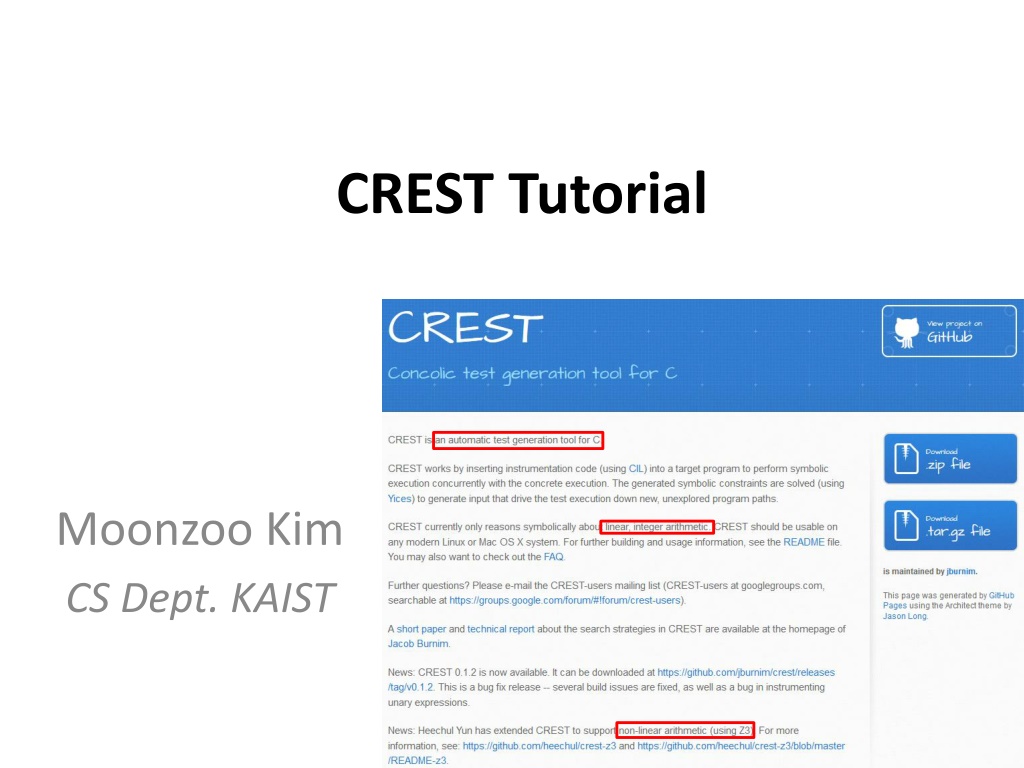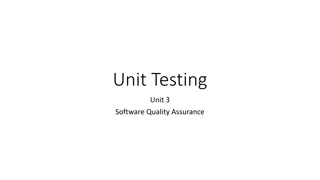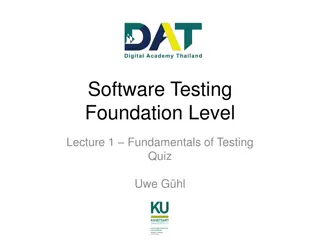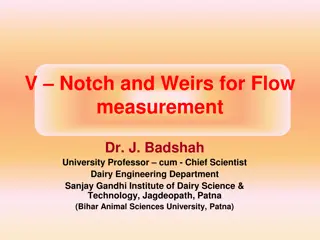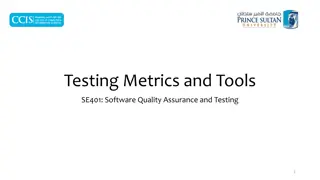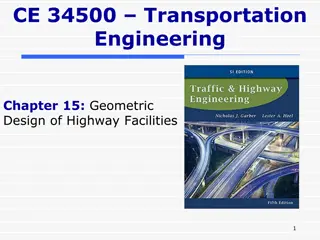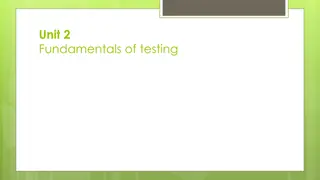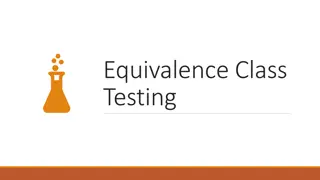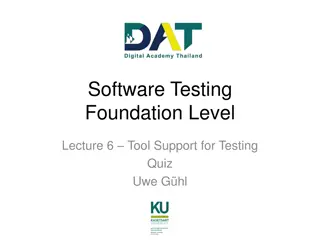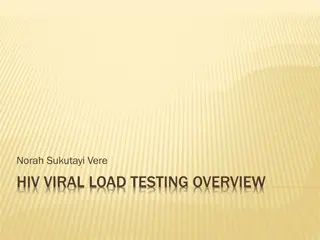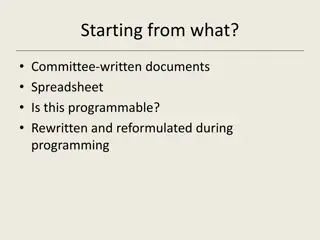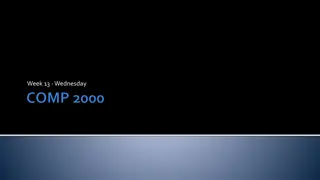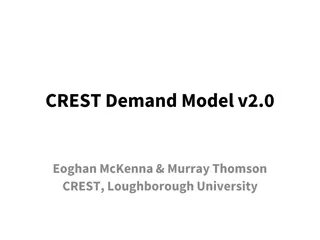Overview of CREST Testing Tool
CREST is a concolic testing tool developed for C programs. It automatically generates test inputs, executes the target program, and explores all possible execution paths systematically. This tool, primarily written in C++, offers an open-source re-implementation of CUTE. The instrumentation of CREST is implemented as a module of CIL written in Ocaml. Learn about the main steps of concolic testing and the tasks involved for human engineers in software testing
Download Presentation

Please find below an Image/Link to download the presentation.
The content on the website is provided AS IS for your information and personal use only. It may not be sold, licensed, or shared on other websites without obtaining consent from the author.If you encounter any issues during the download, it is possible that the publisher has removed the file from their server.
You are allowed to download the files provided on this website for personal or commercial use, subject to the condition that they are used lawfully. All files are the property of their respective owners.
The content on the website is provided AS IS for your information and personal use only. It may not be sold, licensed, or shared on other websites without obtaining consent from the author.
E N D
Presentation Transcript
CREST Tutorial Moonzoo Kim CS Dept. KAIST
CREST CREST is a concolic testing tool for C programs Generate test inputs automatically Execute target under test on generated test inputs Explore all possible execution paths of a target systematically CREST is a open-source re-implementation of CUTE mainly written in C++ CREST s instrumentation is implemented as a module of CIL(C Intermetiate Language) written in Ocaml Moonzoo Kim SWTV Group 2/20
Overview of CREST code C source code cil/src/ext/crestInstrument.ml CIL EXT src/libcrest/crest.cc src/base/symbolic_interpreter.cc src/base/symbolic_execution.cc src/base/symbolic_expression.cc src/base/symbolic_path.cc src/base/symbolic_predicate.cc CREST symbolic execution library Instrumented code Legend Source code External tool GCC src/run_crest/run_crest.cc src/run_crest/concolic_search.cc src/base/yices_solver.cc src/base/symbolic_execution.cc src/base/symbolic_expression.cc src/base/symbolic_path.cc src/base/symbolic_predicate.cc src/base/basic_types.cc CREST constraint yices run_crest next input Moonzoo Kim SWTV Group 3/20
4 Main Steps of Concolic Testing Preprocessor of Concolic Testing: CIL and Ocaml 1. Instrumentation of a target program To insert probes to build symbolic path formula 2. Transform a constructed symbolic path formula to SMT-compatible format SMT solvers can solve simple formula only 3. Select one branch condition to negate Core technique impacting both effectiveness and efficiency 4. Invoking SMT solvers on the SPF SMT formula Selection of a SMT solver and proper configuration parameters Back-end Engine of Concolic Testing: SMT solver and API Application in CREST Real-world Concolic Testing 1: Memory model and CFG algorithm Real-world Concolic Testing 2: Hybrid Concolic + Genetic and distributed DFS algorithm 4/47
4 Main Tasks of Human Engineers 1. Adding proper assert() statements W/o assert(), no test results obtained 2. Selection of symbolic variables in a target program Identify which parts of a target program are most important 3. Construction of symbolic external environment To detect real bugs 4. Performance tuning and debugging To obtain better concolic testing results SAT based Automated Program Analysis Technique: a Case Study on Flash Memory File System Real-world case study: Libexif (system level testing) and security lib (unit level testing) 5/47
Software Testing a craftsman s approach 2nded by P.C.Jorgensen (no check for positive inputs) 1 #include <crest.h> 2 main() { 3 int a,b,c, match=0; 4 CREST_int(a); CREST_int(b); CREST_int(c); // filtering out invalid inputs 5 if(a <= 0 || b<= 0 || c<= 0) exit(); 6 printf("a,b,c = %d,%d,%d:",a,b,c); 7 8 //0: Equilateral, 1:Isosceles, // 2: Not a traiangle, 3:Scalene 9 int result=-1; 10 if(a==b) match=match+1; 11 if(a==c) match=match+2; 12 if(b==c) match=match+3; 13 if(match==0) { 14 if( a+b <= c) result=2; 15 else if( b+c <= a) result=2; 16 else if(a+c <= b) result =2; 17 else result=3; 18 } else { 19 if(match == 1) { 20 if(a+b <= c) result =2; 21 else result=1; 22 } else { 23 if(match ==2) { 24 if(a+c <=b) result = 2; 25 else result=1; 26 } else { 27 if(match==3) { 28 if(b+c <= a) result=2; 29 else result=1; 30 } else result = 0; 31 } }} 32 printf("result=%d\n",result); 33 } Moonzoo Kim SWTV Group
Concolic Testing the Triangle Program Test case (a,b,c) conditions (PC) 1 1,1,1 a=b a=c b=c Input Executed path Next PC Solution for the next PC Unsat 1,1,2 a=b a=c b c a=b a c a=b a c b c a+b c a=b a c b c a+b > c 2,2,3 a=b a c b c a+b >c a=b a c b=c a b a b a=c b c a+c>b a b a=c b c a+c b 2 3 1,1,2 2,2,3 Unsat 2,1,2 2,5,2 4 2,1,2 a=b a b a c a=c a=c b=c b c b c b c b=c TC1 a+c >b TC4 a+b c TC2 a+b >c TC3 Moonzoo Kim SWTV Group
CREST Commands crestc <filename>.c Output <filename>.cil.c branches // lists of paired branches <filename> // executable file run_crest ./filename <n> -[dfs|cfg|random|r andom_input|hybrid] <n>: # of iterations/testings dfs: depth first search (but in reverse order) cfg: uncovered branch first random: negated branch is randomly selected random_input: pure random input hybrid: combination of dfs and random // instrumented C file Moonzoo Kim SWTV Group
Instrumented C Code #line 10 { /* Creates symbolic expression a==b */ __CrestLoad(36, (unsigned long )(& a), (long long )a); __CrestLoad(35, (unsigned long )(& b), (long long )b); __CrestApply2(34, 12, (long long )(a == b)); if (a == b) { __CrestBranch(37, 11, 1); //extern void __CrestBranch(int id , int bid , unsigned char b ) __CrestLoad(41, (unsigned long )(& match), (long long )match); __CrestLoad(40, (unsigned long )0, (long long )1); __CrestApply2(39, 0, (long long )(match + 1)); __CrestStore(42, (unsigned long )(& match)); match ++; } else { __CrestBranch(38, 12, 0); } } Moonzoo Kim SWTV Group
Execution Snapshot (1/2) [moonzoo@verifier crest]$ cat coverage 3 /* covered branch ids*/ 4 5 6 7 8 11 12 14 15 17 18 20 21 22 23 24 25 26 27 28 29 30 31 32 33 34 35 36 37 38 39 [moonzoo@verifiercrest]$ run_crest ./triangle 10000 -dfs Iteration 0 (0s): covered 0 branches [0 reach funs, 0 reach branches]. Iteration 1 (0s): covered 1 branches [1 reach funs, 32 reach branches]. Iteration 2 (0s): covered 3 branches [1 reach funs, 32 reach branches]. Iteration 3 (0s): covered 5 branches [1 reach funs, 32 reach branches]. a,b,c = 1,1,1:result=0 Iteration 4 (0s): covered 13 branches [1 reach funs, 32 reach branches]. a,b,c = 2,1,1:result=2 Iteration 5 (0s): covered 17 branches [1 reach funs, 32 reach branches]. a,b,c = 2,1,2:result=1 Iteration 6 (0s): covered 20 branches [1 reach funs, 32 reach branches]. a,b,c = 1,2,1:result=2 Iteration 7 (0s): covered 21 branches [1 reach funs, 32 reach branches]. a,b,c = 3,2,1:result=2 Iteration 8 (0s): covered 24 branches [1 reach funs, 32 reach branches]. a,b,c = 2,1,3:result=2 Iteration 9 (0s): covered 25 branches [1 reach funs, 32 reach branches]. a,b,c = 4,3,2:result=3 Iteration 10 (0s): covered 27 branches [1 reach funs, 32 reach branches]. a,b,c = 2,3,1:result=2 Iteration 11 (0s): covered 28 branches [1 reach funs, 32 reach branches]. a,b,c = 3,2,2:result=1 Iteration 12 (0s): covered 29 branches [1 reach funs, 32 reach branches]. a,b,c = 2,2,1:result=1 Iteration 13 (0s): covered 31 branches [1 reach funs, 32 reach branches]. a,b,c = 1,1,2:result=2 Iteration 14 (0s): covered 32 branches [1 reach funs, 32 reach branches]. Moonzoo Kim SWTV Group
Execution Snapshot (2/2) [moonzoo@verifier crest]$ cat input 1 1 2 [moonzoo@verifiercrest]$ run_crest ./triangle 10000 -dfs Iteration 0 (0s): covered 0 branches [0 reach funs, 0 reach branches]. Iteration 1 (0s): covered 1 branches [1 reach funs, 32 reach branches]. Iteration 2 (0s): covered 3 branches [1 reach funs, 32 reach branches]. Iteration 3 (0s): covered 5 branches [1 reach funs, 32 reach branches]. a,b,c = 1,1,1:result=0 Iteration 4 (0s): covered 13 branches [1 reach funs, 32 reach branches]. a,b,c = 2,1,1:result=2 Iteration 5 (0s): covered 17 branches [1 reach funs, 32 reach branches]. a,b,c = 2,1,2:result=1 Iteration 6 (0s): covered 20 branches [1 reach funs, 32 reach branches]. a,b,c = 1,2,1:result=2 Iteration 7 (0s): covered 21 branches [1 reach funs, 32 reach branches]. a,b,c = 3,2,1:result=2 Iteration 8 (0s): covered 24 branches [1 reach funs, 32 reach branches]. a,b,c = 2,1,3:result=2 Iteration 9 (0s): covered 25 branches [1 reach funs, 32 reach branches]. a,b,c = 4,3,2:result=3 Iteration 10 (0s): covered 27 branches [1 reach funs, 32 reach branches]. a,b,c = 2,3,1:result=2 Iteration 11 (0s): covered 28 branches [1 reach funs, 32 reach branches]. a,b,c = 3,2,2:result=1 Iteration 12 (0s): covered 29 branches [1 reach funs, 32 reach branches]. a,b,c = 2,2,1:result=1 Iteration 13 (0s): covered 31 branches [1 reach funs, 32 reach branches]. a,b,c = 1,1,2:result=2 Iteration 14 (0s): covered 32 branches [1 reach funs, 32 reach branches]. [moonzoo@verifier crest]$ print_execution (= x0 1) (= x1 1) (= x2 2) (> (+ 0 (* 1 x0)) 0) (> (+ 0 (* 1 x1)) 0) (> (+ 0 (* 1 x2)) 0) (= (+ 0 (* 1 x0) (* -1 x1)) 0) (/= (+ 0 (* 1 x0) (* -1 x2)) 0) (/= (+ 0 (* 1 x1) (* -1 x2)) 0) (<= (+ 0 (* 1 x0) (* 1 x1) (* -1 x2)) 0) -1 4 6 8 11 15 18 27 28 29 -2 Moonzoo Kim SWTV Group
Supported Symbolic Datatypes #define CREST_unsigned_char(x) __CrestUChar(&x) #define CREST_unsigned_short(x) __CrestUShort(&x) #define CREST_unsigned_int(x) __CrestUInt(&x) #define CREST_char(x) __CrestChar(&x) #define CREST_short(x) __CrestShort(&x) #define CREST_int(x) __CrestInt(&x) Moonzoo Kim SWTV Group
Decision/Condition Coverage Analysis by CREST 1 int main(){ 2 int A, B, C, D; 3 if (A && B || C && D){ 4 printf("Yes\n"); 5 }else{ 6 printf("No\n"); 7 } 8 } 1 if (A != 0) { 2 __CrestBranch(5, 2, 1); 3 if (B != 0) { 4 __CrestBranch(10, 3, 1); 5 printf("Yes\n"); 6 } else { 7 __CrestBranch(11, 4, 0); 8 goto _L; 9 } 10 } else { 11 __CrestBranch(6, 5, 0); 12 _L: /* CIL Label */ 13 if (C != 0) { 14 __CrestBranch(16, 6, 1); 15 if (D != 0) { 16 __CrestBranch(21, 7, 1); 17 printf("Yes\n"); 18 } else { 19 __CrestBranch(22, 8, 0); 20 printf("No\n"); 21 } 22 } else { 23 __CrestBranch(17, 9, 0); 24 printf("No\n"); 25 } 26 } A == T A == T && B == T A == T && B != T CREST consider all possible cases with short-circuit A != TRUE (A != T || A == T && B != T) && C == T (A != T || A == T && B != T) && C == T && D == T Thus, coverage reported by CREST might be lower than actual branch coverage (A != T || A == T && B != T) && C == T && D != T (A != T || A == T && B != T) && C != T 13/13
